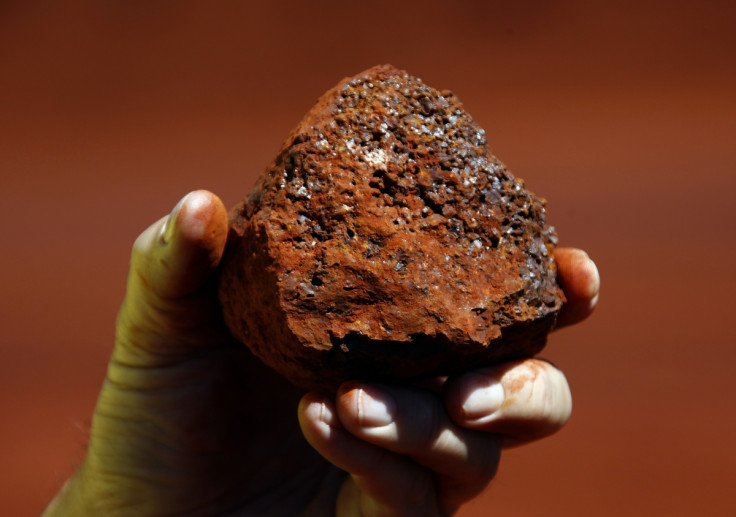Commodities Trading: Kate Kelly Unveils the Secret Club that Runs the World

The commodities boom of the 2000s was so great that the term "super-cycle" was employed to describe the seemingly ever-growing price rises of physical commodities.
The boom was part-fuelled by increasing consumption in the developing world, while concerns over oil supply added more pressure to prices. Kate Kelly, a reporter at CNBC, believes that a small group of traders were also responsible to some extent.
By June 2014, the topic has become so mainstream that even Pope Francis is talking about commodity trading. He called speculative gambling on commodity prices a "scandal" that produced "intolerable" levels of wealth for a few.
The pontiff was referring to a series of investigations that have plagued the sector in recent years, after global investment banks piled into it. Annual revenues reached a peak of $15bn during the height of the boom in 2008 and 2009.
High profile investigations have been carried out at some of these banks that rode and fuelled the super-cycle. Multimillion dollar fines for market manipulation have been meted out to some, while investigations continue at others.
New scandals are breeding new investigations. In June, the Qingdao port in China came under investigation amid allegations that financing using metals stored in warehouses as collateral has gone awry.
All of this makes Kate Kelly's new book, The Secret Club That Runs the World: Inside the Fraternity of Commodity Traders, very timely release. The CNBC reporter has spent three years criss-crossing the globe, getting inside the heads of some of the key players in the commodities boom.
In a conversation with IBTimes UK, Kelly revealed that a meeting with a Nebraska farmer turned her on to the subject.
"I did a story on a farmer in Nebraska, who was using Twitter to talk about what was going on with his crops in the planting season. It turned out market brokers were picking up on what he was saying as market colour," said Kelly.
"He in turn developed friendships with brokers and traders, and they were telling him what they were spotting in terms of trends and the futures market, as well as the actual market. He was then using that to inform when he would sell his crop to try to lock in better prices."
This is classic commodity trading in its most traditional guise. For centuries farmers have sought to secure themselves against potential crop failures by offering a share of future crops at a guaranteed price in return for an up-front payment.
The influx of specialist financial traders into the market in the 2000s saw the variety and volume of contracts spike. So too, did the size of revenues and profits being generated in the sector. Yet this group of traders remained relatively unknown to the public.
"It's difficult to penetrate and a lot of them know each other. 'Runs the world' is hyperbolic but, I'm trying to make a serious point, that in terms of commodities trading it can impact prices, and the extent of the influence isn't understood or known, but there are some cases where we see a fairly clear connection," she added.
The power of traders to influence prices is one of the key themes in Kelly's book, one that the author returns to on several occasions.
Jon Ruggles, a savvy trader who was hired to trade fuel for Delta Airlines, made millions on a purely speculative bet on heating oil that shored up underperformance elsewhere in the company.
Jennifer Fan made millions of dollars for Morgan Stanley when her bet on oil prices came good after super-storm Sandy battered the United States' east coast.
Yet these same characters that make massive revenues on trades are still subject to the whims of the markets, as is made clear in the book's opening account.
The powerlessness of Pierre Andurand, co-founder of BlueGold, one of the most successful commodity hedge-funds of its time is laid bare in dramatic fashion. Having been on the right side of oil trades for so long, he gravely miscalculated the market, leading to a half a billion dollar loss for the fund in a single day.
Ruggles came unstuck at Delta too, leaving for a number of reasons while under the cloud of an investigation by the Commodities Futures Trading Commission.
Kelly's insight into the personalities of The Secret Club, a mixture of big egos and even bigger insecurities, makes for compelling reading. As market dramas unfold around them though, with big wins turning into losses, it becomes clear that the secret club can come unstuck too.
As well as portraying the key figures behind the boom, Kelly provokes a debate over the role that speculators should have in commodity markets. The author explores the impact that speculation on wheat had on prompting revolution in Egypt, the world's biggest importer of the grain.
Kelly told IBTimes UK that she hopes the book will provoke debate over the role speculators should have on commodities, whose volatile prices can upset political and social systems.
"There was a big outcry in the United States in 2008 over the cost of gasoline," she said.
"There was so much speculative activity in the market and the oil contracts were so expensive as well, they reached all-time highs - that is a good example for people to look at the coincidence of high contract prices with high actual prices."
"I think it would be helpful if we had a little more academic study of these connections, and a little more plain spoken discussion about it too because I think it's something everyone needs to care about."
© Copyright IBTimes 2024. All rights reserved.







